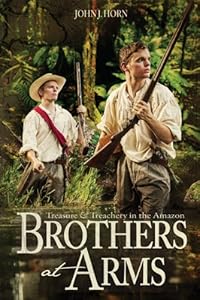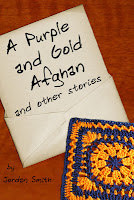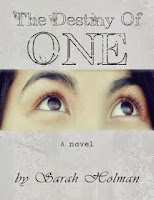Melika, Welcome to Homeschool Authors.
Hi Sarah! It’s great to be here!
Describe yourself in five words.
God-loving. Loyal. Creative. Focused. Joyful.
Tell us a little more about yourself.
I have been an author since I was fourteen and write historical fiction, suspense, supernatural thrillers, fantasy, sci-fi, short stories—you name it, I write it! I love to read just about anything and everything and am particularly fond of historical fiction, the classics, mysteries, epic fantasy, history, and non-fiction. I am also a classically trained soprano/violinist/pianist and have been performing since the age of three. Additionally, I hold a BA in Management and an MBA in Marketing.
If I had not decided to become a writer, I would have become a marine biologist, but after countless years spent watching Shark Week, I realized I am very attached to my arms and legs and would rather write sharks into my stories than get up close and personal with those toothy wonders.
What was your favorite part of being homeschooled?
I received so many blessings as a result of being homeschooled! I would not be the writer I am today if it had not been for my fantastic high school English curriculum, which could be defined as “classics, classics, classics!” Homeschooling instilled in me such a love and appreciation for these phenomenal works. Additionally, I believe reading classics from a young age molds your mind to appreciate fine literature. It’s like being classically trained in voice—if you have great training, you can sing anything. The same goes for reading. Even though I read a great variety of books from different genres, classics remain my favorites and are my “go-to” books.
Homeschooling also taught me the value of independent study and being self-sufficient. You certainly can’t blame your schoolmates for holding you back when you are the only one in the class! This self-reliance and discipline went on to help me a great deal in college, graduate school, and my post-academic life ever since.
Who is your favorite literary character?
I have to pick just one?! All right, it would have to be David Copperfield. I read this book close to sixteen years ago and can still quote passages and remember scenes vividly. All the suffering and hardships this young 19th century Englishman endured and all the mistakes he made in love and in life transcended the ages and became so relevant to me, a preteen living in the United States in the 20th century. That is truly a testament to the genius of Charles Dickens. It is also what I think makes a book a classic—its timelessness.
What caused you to start writing?
My love for writing grew out of an early love for reading. I think what led me to this point, what essentially caused the inspiration to germinate, was that my mother started reading to me when I was in the womb, and my father told me wild, not-exactly-verifiable tall tales while I was still in the cradle. I remember writing little stories and vignettes when I was a very young child and also staging my first play (an adaptation of King of Kings) when I was eight years old. The budget was nonexistent, so my family was conscripted into the production, with my dad and mom playing six parts each. I think that was when the writing bug first reared its head and bit me squarely on the heart. I felt a little like Cecil B. DeMille after that. There is a VHS of the play floating around somewhere. It is one of my first memories of writing.
One turning point I can recall was when I was about eleven or twelve. I wrote a very short story along the lines of Jurassic Park. It was about a brother and sister being chased to the edge of a cliff by a T-Rex. The kids gave the Rex the old “one-two-jump!” fake out and the dinosaur tumbled over the cliff. End of story—happily ever after for everyone except the Rex. But the point was that it was fun! I had actually finished something I’d set out to write! It was great, even though it was only six pages long! You have to start somewhere, right?
However, I had never considered turning writing into a career until I read Crime and Punishment when I was a senior in high school. There was just something about that book and the way Dostoevsky painted with words that inspired me and made me seriously think about becoming a storyteller. But the real impetus behind my decision came in the winter of 2001 as I sat in a darkened theater and heard Gandalf the Grey speak the following line to Frodo Baggins:
“All we have to decide is what to do with the time that is given to us.”
That was it, and I haven’t looked back since.
What inspired City of Lights?
One night in December 2002, I was puttering around in my room when I suddenly started singing verses of a song I had made up in that moment.
“Tonight’s the last time that I’ll see your face, my love. This dreadful moment has finally come to be. Tonight the passion ends for you and me, my love. I’m traveling to a place where life will be hell for me…good-bye.”
My mind exploded with questions. Who was this girl? Why was she being forced to give up her love? Why would her life be so awful?

From that song, City of Lights: The Trials and Triumphs of Ilyse Charpentier was born. The song became Tonight, the lyrics directly inspiring the novel and making their way into a pivotal scene toward the end of the book. Now, the only thing remaining was a setting. I’m a singer, a Francophile, and a devotee of fin de siècle culture and literature, so the idea of Paris, forbidden love, and the added tension arising from my heroine being estranged from her brother (her only living relative) was too exciting not to pursue.
My grand plan all along was (and still is) for City of Lights to be a musical. In addition to Tonight, I wrote eight other songs that inspired further chapters and the overall story arc, the lyrics of those songs also being adapted into dialogue and scenes. Even though the musical is still on the distant horizon, the spirit of the songs thread through the entire novel. And in case you were wondering, the recordings are securely stored in an undisclosed location, waiting for the day when they will see the light once again. ;)
What is it about?
City of Lights is first and foremost the story of Ilyse Charpentier, a young singer in 1894 Paris who has never experienced love because of the stranglehold her patron, Count Sergei Rakmanovich, has upon her life. All that changes when she meets Ian McCarthy, a dashing, young English expatriate. Needless to say, the Count is not at all pleased with this new obstacle. As I mentioned before, Ilyse has also been estranged from her younger brother Maurice, who blames her for letting the Count drive them apart. Things are complicated further when the Count devises a way to use Maurice as leverage to get Ilyse to agree to his demands. Without giving anything else away, Ilyse is forced to make a life-shattering choice that has the potential to destroy her hope of finding the love and freedom she has always been denied.
Who will enjoy it?
I’ve had readers from 14 to 87 tell me how much they loved the story and how happy they were to read a clean, pure romance—with quite a bit of brother-sister conflict added to the mix. I wrote City of Lights at the age of 18, and it was always my intention to produce a novel that teens, parents, and readers of any age could enjoy. In my stories, I never shy away from showing evil for what it is, and more importantly showing how people triumph over it by determination, the help of allies, and the grace of God, but I don’t believe there is any need to get gratuitous in the content department. Doing so cheapens your work and turns off a whole swath of readers, myself included. If I wouldn’t read it, I certainly wouldn’t write it.
One of my favorite examples of how to convey an impactful statement without resorting to graphic descriptions comes from a movie that had a huge impact on my decision to become a writer—The Fellowship of the Ring: “Isildur, son of the king, took up his father’s sword.” There are so many implications in that little gem of restraint. Took up his father’s sword and did what? Cut the Ring, and consequently the fingers, off Sauron’s hand! There was no need to dwell on blood loss or gore to get the point across. There is a scene in my supernatural/historical thriller, Corcitura, where I describe a cadre of undead creatures descending on their victim. That could have turned into a terribly gory scene, but here is how I took a page from FOTR and held back for a more subtle (and I think consequently more horrifying) effect:
There was a shriek and then I heard a sickening crunch as Arabella’s cries died to a whimper. Something thumped against the ground as Augustin Boroi stepped back and drew his arm across his mouth.
The sleeve of his shirt had doubled as a napkin. It was no longer white when he pulled it away.
See? There is no need to slide into the mire of gratuitousness to be effective. More often than not, what is left up to the imagination is infinitely more scary, thought-provoking, and powerful than spelling out every aspect of a scene in bloody red letters.
Do you plan to write more books?
Definitely! In addition to Corcitura (which was published last November), I am completely rewriting my original first novel that I began at the age of fourteen, but abandoned for school, life, and other projects. I have been working on it since July of 2012 and have been totally transforming it into a dystopian epic set in a brutal and lawless world. The entire theme and outcome of the story have changed drastically, but all the exciting bits (mythical beasts, hidden identities, battles, political intrigue, and some truly horrifying and treacherous villains) are still part of the fabric of the story. With the passage of years, however, everything within the story seems to have more meaning and gravitas to me now. It is definitely not the same book I would have written as a fourteen-year-old, so I am very happy I put the novel on hold.
I am also mapping out and reworking my fantasy duology (which I’ve been writing since 2003) and am currently finishing up a collection of short comedy/fantasy/mythical stories set in Eastern and Northern Europe in the 1800s. It has been an exciting challenge to essentially create “Novels in Miniature” for this collection.
Do you have any final thoughts?
One thing I always keep in mind is a quote from St. Catherine of Siena: “Be who God meant you to be and you will set the world on fire.” In that spirit, I would strongly encourage all homeschoolers, especially those of you who are writers, to use the incredible opportunities God has given you to further your literary dreams and aspirations. Develop your talents, use the free time you have to broaden your horizons with additional reading and study of the genres you are drawn to, and write, write, write! A homeschool education is a blessing, so be a blessing to others by sharing your talents with the world. God has given you this time for a reason…so now it’s up to you to decide what you are going to do with it. :)
Additionally, I would love to connect with other homeschool authors, readers, and parents. Please feel free to contact me on any or all of the following sites:
My web site.
My Goodreads.
My Twitter.
Thank you so much, Sarah, for giving me the opportunity to be interviewed! I’ve had a great time! :D
Melika, is giving away a digital copy of City of Lights.




















